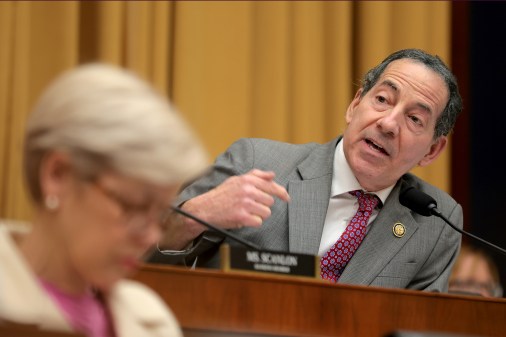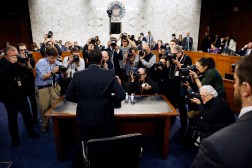White House faces deeply skeptical Congress as it advocates for controversial surveillance tool

As the Biden administration begins its campaign to urge Congress to renew a controversial surveillance provision that authorizes intelligence agencies to carry out warrantless data collection, it will face a skeptical Congress where distrust of government spying runs deep.
Section 702 of the Foreign Intelligence Surveillance Act, which was saved from the brink of sunsetting by Congress twice before, is in perhaps its most precarious position yet. Leading House Republicans, including House Judiciary Chairman Jim Jordan, R-Ohio, have signaled strong opposition to renewing surveillance. House Minority Leader Hakeem Jeffries, D-N.Y., voted against reauthorization in 2018 while other Democrats have made it clear that their support for reauthorization is dependent on significant reforms.
Those signs of early opposition to the law, which is set to expire at the end of this year, may be the reason the White House has started to publicly push for its renewal 10 months before 702 expires. In statements released Tuesday and during an event at the Brookings Institution the same day, top law enforcement and national security officials made their case that 702 has become an essential tool for protecting Americans against a growing number of threats.
“The Biden-Harris Administration strongly supports the reauthorization by Congress of Section 702 of the Foreign Intelligence Surveillance Act (FISA), a vital intelligence collection authority,” National Security Advisor Jake Sullivan said in a statement released Tuesday. “This authority is an invaluable tool that continues to protect Americans every day and is crucial to ensuring that U.S. defense, intelligence, and law enforcement agencies can respond to threats from the People’s Republic of China, Russia, nefarious cyber actors, terrorists, and those who seek to harm our critical infrastructure.”
Attorney General Merrick Garland and Director of National Intelligence Avril Haines accompanied the statement with a letter to Congressional leadership urging members to act to renew the authority, adding that the tool “has proven invaluable again and again in protecting American lives and U.S. national security.”
The intelligence community has posed losing the tool as disastrous for U.S. national security, including against growing cybersecurity threats. “Section 702 is critical to our ability to understand the nature of the cyber attacks that we face on a consistent basis from nation states — China, Russia, Iran,” U.S. Assistant Attorney General Matthew Olsen said at the Brookings event.
Examples of threats to U.S. national security foiled by Section 702 intelligence include identifying foreign ransomware attacks on critical infrastructure, according to the Justice Department. Officials say getting information to stop such attacks fast enough without Section 702 would be impossible. “We simply don’t have the means to collect information, certainly not at the speed of a cyberattack, that would allow us to understand it or potentially mitigate it in time,” Olsen said.
Civil liberties advocates have long expressed concerns that the tool comes with a cost to Americans, whose data is often swept up in surveillance operations. In 2021, the FBI alone queried that data collected through FISA for nearly 3.4 million U.S. persons, all without needing a warrant. Distrust in FISA more generally was further deepened on the right by when the FBI used misleading statements in obtaining a warrant using a different FISA authority than Section 702 to surveil a Trump campaign associate.
“Section 702 has morphed into a domestic spying tool for the FBI. The government claims to be targeting people overseas, but it is clearer than ever that agents are using this surveillance as a backdoor into Americans’ private emails and messages,” said Patrick Toomey the deputy project director for the National Security Project at the ACLU said. “Members of Congress should not vote to reauthorize Section 702 without significant reforms that will protect Americans.”
Olsen said he disagrees with critics who say that FBI searches of Section 702 data amount to illegal, “backdoor” searches, noting that the Fourth Amendment does not apply to non-U.S. persons outside of the country. “I don’t think it’s a valid criticism,” said Olsen. “I don’t think it’s a backdoor search I think it’s how Section 702 is intended to be used.”
Olsen acknowledged that the Biden administration faces a challenge in recovering from mistakes in recent years and rebuilding the trust of Congress and the American people in the authority. He pointed to requiring FBI personnel to affirmatively opt-in to 702 searches and requiring pre-approval requirements for certain types of sensitive U.S. person data as starting points.
The Biden administration will have its first major chance to court Congress on the matter next week when intelligence officials present their annual worldwide threat assignment to Senate Intelligence committee members. Olsen expressed optimism that despite distrust in Congress, members will come to the table and reauthorization will “prevail.”
“I trust every member of Congress will understand this one point and that is that national security transcends politics,” said Olsen. “National security is more important than what political party you belong to and national security is not a game where you use politics to score points.”
Olsen didn’t discuss what if any amendments to FISA Section 702 the White House would consider but he and other members of the intelligence community have warned against “watering down” the authority.
Civil liberties advocates say that’s not good enough. “The Intelligence Community’s request on FISA Section 702 seems both desperate and detached from the reality of how problematic this program is,” Jake Laperruque, deputy director at the Security and Surveillance Project for the Center For Democracy & Technology said in response to the letter sent to Congress. “Claiming the law provides ‘robust privacy and civil liberties safeguards’ for FISA 702 is like saying a tank top provides robust protection from a snowstorm.”





